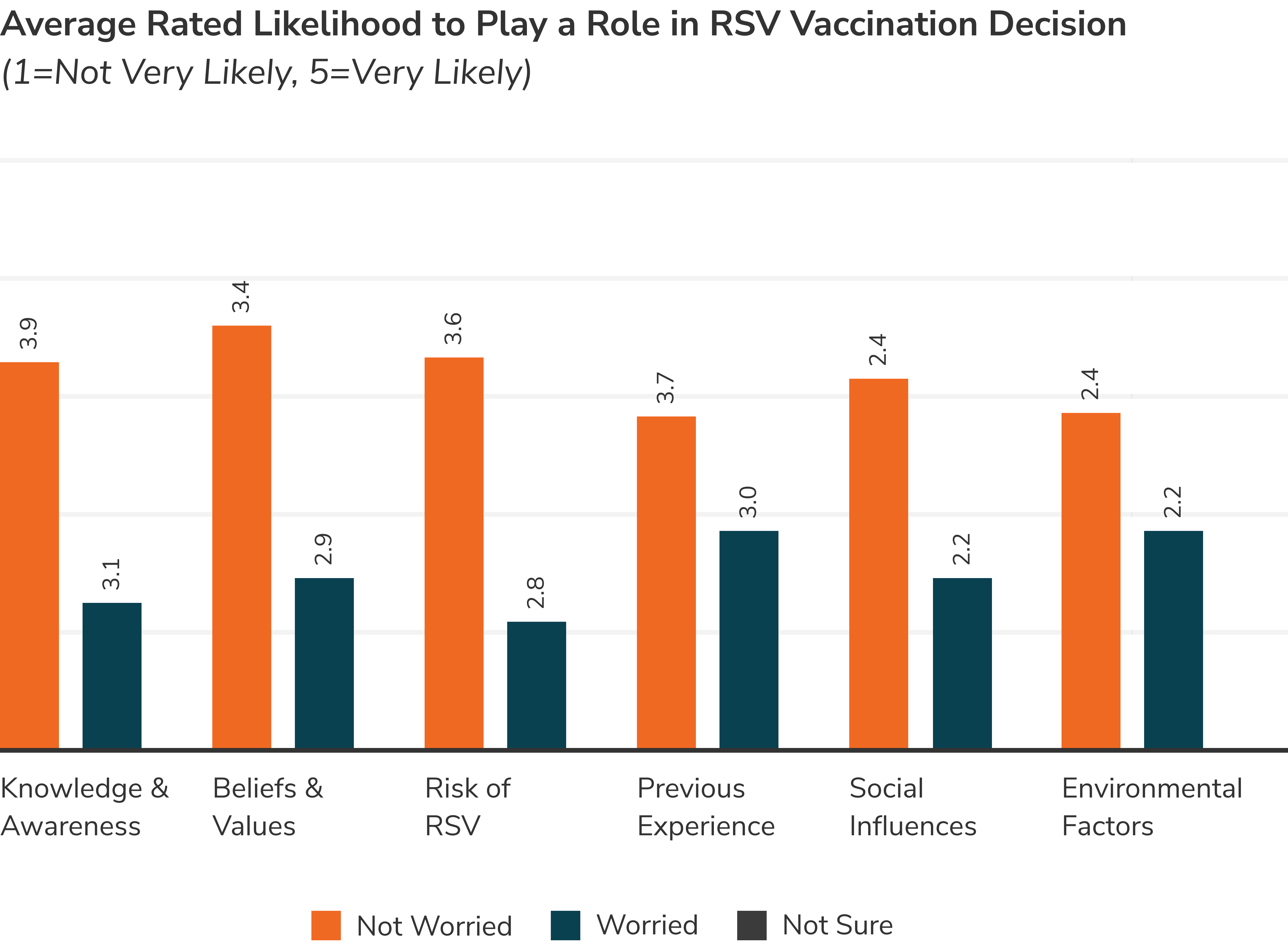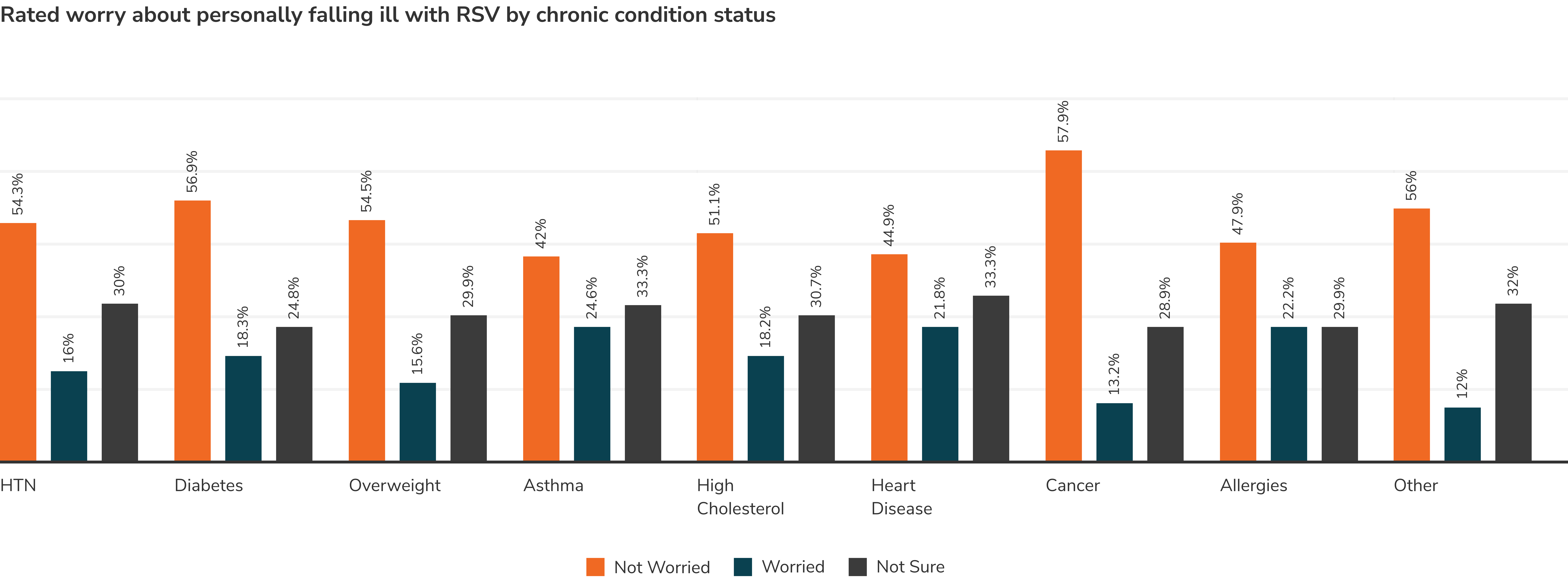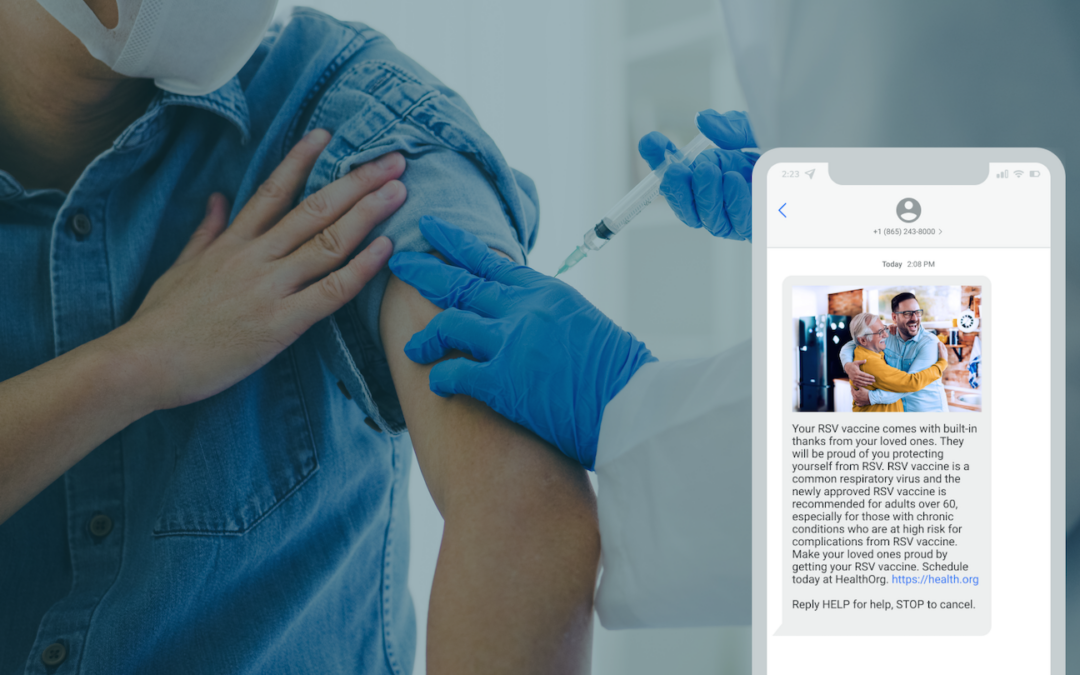One of the most exciting opportunities we have at Lirio is to co-develop with our client partners. But academic literature doesn’t always deliver the insights we need to design and develop effective interventions, such as in the case of emerging medical innovations like newly developed vaccines. In such cases, our behavioral research team conducts primary research with consumers to learn first-hand the reasons why people may – or may not – adopt health behaviors recommended by medical professionals. We faced this situation while co-developing a new Precision Nudging Intervention for adult respiratory syncytial virus (RSV) vaccine, which the FDA approved for the first time in June 2023.
Here’s what we learned:
Most older adults eligible for the RSV vaccine reported no concern about their RSV risk
RSV is a common respiratory virus that usually causes mild, cold-like symptoms. RSV can cause illness in people of all ages, but may be especially serious for older adults. Yet 56.8% of adults in the 60-plus age group eligible for the RSV vaccine indicate they are “not worried” about personally falling ill from RSV.
That’s according to a nationwide survey by Lirio with a demographically representative sample of 774 American adults 60 and older. The survey was conducted in Q3 2023, within a month of the RSV vaccine’s approval by the FDA and before it was available in pharmacies. While behavioral research is clear that inciting fear is not effective in changing health behaviors, the finding that most respondents do not realize RSV can be risky for older adults suggests a need for clear and credible education about RSV.
Older adults who get the flu vaccination are more likely to get the RSV vaccine
At the time the survey was conducted, the RSV vaccination was new enough that many respondents had not had a chance to talk to a clinician about it. The lack of recommendations from providers to get vaccinated was the number one reason eligible older adults said they would not get the RSV vaccine (44.9%), followed closely by a lack of confidence in the effectiveness of vaccines (44.8%); lack of knowledge of the importance of the RSV vaccine (39.1%); and perceiving vaccination as low on their priority list (37.9%). According to prior research, these are also reasons why people may not receive the flu vaccination. Their relevance here suggests people may treat flu and RSV vaccination similarly.
In fact, those who indicated prior flu vaccination also indicated concern over contracting RSV. 69.4% of the survey sample reported getting the flu vaccine in the previous 12 months Those who got the flu vaccine were more worried (16.4%) and more unsure (32.7%) about falling ill with RSV than those who did not get the flu vaccine (7.5% and 22.2%). In addition, those who reported getting the flu vaccine rated all six categories of determinants for RSV vaccination – and especially so “Risk of contracting RSV” – more likely to play a role in their decision to get the RSV vaccine. The willingness of people with a recent flu vaccination to consider multiple factors as inputs into their decision to receive a newly approved RSV vaccine suggests the positive correlation between prior vaccination history and acceptance of future vaccines may be related to openness to information.

Even most older people with chronic conditions reported no worries about falling ill
RSV can cause severe complications in older adults, including pneumonia, hospitalization, and death. Older adults with chronic medical conditions like heart or lung disease, weakened immune systems, or those who live in nursing homes are at the highest risk of serious illness and complications from RSV. But there still appears to be a low level of concern among older adults about falling seriously ill RSV. Even among Lirio survey respondents with one or more chronic conditions such as hypertension, asthma, and cancer, the majority indicated they were “not worried” about RSV risks.
The level of concern about falling ill with RSV varied among which chronic condition respondents were diagnosed with. Those with asthma (24.6%), allergies (22.2%), and heart disease (21.8%) reported the highest levels of concern. The more health conditions people reported – up to seven current chronic health conditions – the higher the ratings they gave to four out of the six categories of determinants for RSV vaccination.

Awareness of the RSV vaccine is rising
When Lirio’s survey was conducted in July 2023, two RSV vaccines had been available in the United States for just two months. Notably, RSV was one of three illnesses – in addition to influenza and COVID-19 – that contributed to 2022’s “tripledemic,” but was often minimized in media reports in contrast to the other two illnesses. Some survey respondents suggested they were unaware RSV might be a threat for them, with comments such as “I don’t know anything about RSV, and I think it’s for children not adults.”
That said, the sample in the Lirio survey showed greater awareness of RSV vaccination than research performed just a few months. Notably, a March 2023 survey conducted by Health Union found 35% of respondents who were 60 and older said they were aware of an RSV vaccine. Comparatively, only 39.8% of respondents to Lirio’s survey reported being unaware of the RSV vaccine. The proportion of people who are unaware of the RSV vaccine rose quickly due to a variety of factors including the introduction of a third RSV vaccine, patient education, provider outreach, and a successful first vaccination season.
Footer:
Susanne Blazek, Ph.D., contributed to this research and post.
